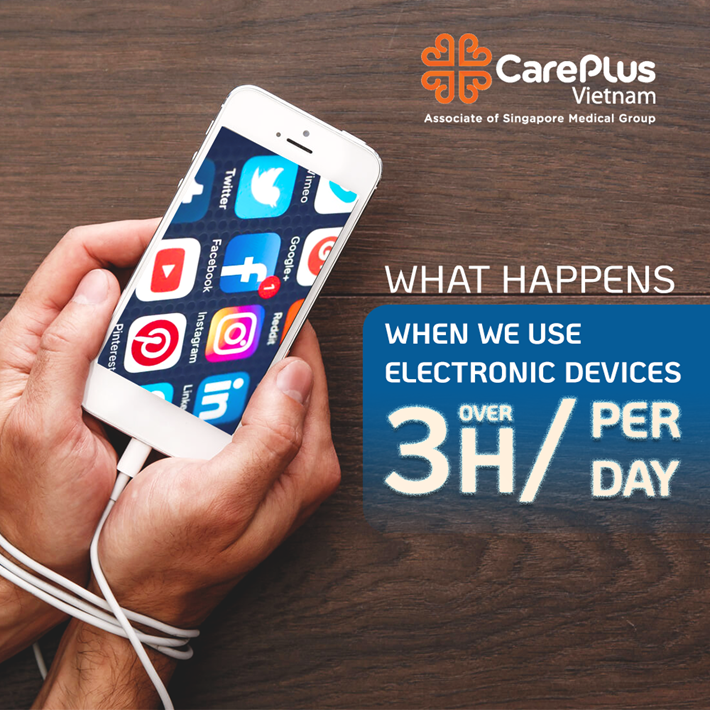What will happen - When we are continuously exposed to electronic devices for more than 3 hours / day
According to the World Health Organization (WHO), 90% of the risk of vision loss is if exposed to electronic screens for more than 3 hours/day. “Screen vision syndrome” is one of the serious eye diseases that we often suffer from when we are exposed to too much electronic screen.

12/5/2022 1:41:57 PM
The most noticeable symptoms are eye pain, eye strain, dry eyes, blurred vision, even neck pain, shoulder pain, fatigue, etc. The cause of this syndrome is due to the blue light emitted from the screen, They penetrate the natural light-filtering layers of the eyeball to the fundus, causing damage to the retina.
Using screens a lot also makes the skin age faster. Collagen structures go deep inside, weakening the skin, gradually damaged over time by computer radiation. Over time, our skin quickly becomes rough, dull, sagging, sagging and wrinkles appear.
Being prone to mental disorders or having a strong psychological impact is a next harm that many of us may not even think about. For those who use the computer too much in continuous repetition, we will form a habit, even "addicted" to sitting at the computer. When we don't sit at the computer anymore, we will easily feel restless, uncomfortable and can only find peace of mind if we open the computer to use it again.
According to experts, if this situation goes on for a long time, it will easily cause mental disorders, sleep disorders, and adversely affect life.
Another problem is finger injuries caused by typing too much. Worse, when we sit for too long a posture in front of the computer will cause problems with muscle damage of shoulder blades, cervical vertebrae, back vertebrae. That is why too many computer users will often experience symptoms such as hand pain, neck fatigue, and shoulder fatigue.
Tips to protect your health when you have to sit in front of the screen too much.
To limit the harmful effects of sitting in front of a screen for a long time, it causes:
a) Adjust the time spent in front of the computer screen appropriately.
- We can apply a very simple rule, easy to follow, recommended by experts in the US: 20 - 20 - 20.
- Specifically, after about 20 minutes of sitting and working with the computer, you should pause, look out at a certain corner about 20 feet away (equivalent to 6m), for about 20 seconds. Then go back to work.
b) Get into the habit of blinking more often or have a small bottle of artificial tears ready to prevent your eyes from drying out.
Sometimes we should also close our eyes for a few minutes to give them a rest.
c) Wear eye protection when using a computer:
Specifically, here is a blue light filter, which helps to block part of the harmful light outside the lens. The image through this lens will fall slightly to yellow, creating a soothing effect for the eyes.
d) Combine eating foods that are good for the eyes:
- We can take supplements of vitamins that contain a lot of vitamin A, or try to eat more green vegetables and fruits. Attention should be paid to adding trace elements such as copper and zinc to prevent aging and keep eyes healthy.
e) Skin protection:
- Reduce the time you spend looking at the computer screen
- Keep a safe distance of about 30 - 45cm in front of the computer screen.
- Put plants that effectively absorb computer heat radiation such as cactus, betel nut, tiger tongue, stone lotus, etc. on the desk.
- Washing your face regularly every 2 hours during sitting or after using the screen also helps to remove some of the radiation clinging to the skin.
- Apply skin protection cream or provide necessary nutrients to the skin from the inside to keep the skin from being damaged by radiation.
f) Protecting the spine and joints:
- We should turn around, change sitting position after about 15-20 minutes of working with the computer.
- Do not ignore the signs of spinal pain, we should stand up and take a deep breath, then do light exercise for the body to relax and recover.
- After each working day, we should combine exercise.
Especially subjects such as yoga, running, swimming, aerobics are very good for increasing flexibility for joints.
- Sitting in front of a computer screen for many hours is inevitable in modern life. Instead of compromising with the harms caused by this behavior, you should actively implement good habits, or take appropriate measures to protect your health, thereby adding more energy to complete well. Work.